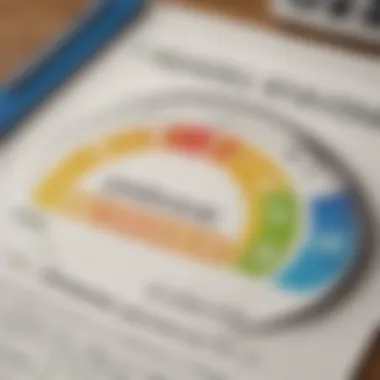Understanding the Impact of a 550 Credit Score


Intro
A credit score of 550 is often viewed as a stumbling block on the path to financial stability. It serves as a warning light, signaling potential pitfalls that individuals might encounter in their financial journeys. When lenders check a credit report, they often make swift judgments based on this score. Therefore, understanding what this score signifies is crucial for anyone navigating the lending landscape.
A score of 550 indicates a poor credit history, shaped by a range of factors that can complicate one's financial opportunities. This neglect can manifest in the form of higher interest rates, limited loan options, and even rejections from potential lenders. But why does this score matter so much, and what can be done to improve it?
Throughout this article, we will explore not only the implications of having a credit score that hovers around the 550 mark but also the nuts and bolts behind it. From common misconceptions to actionable strategies for elevating this score, our goal is to shed light on this often-misunderstood aspect of financial health.
Defining Credit Scores
Credit scores serve as a crucial aspect of personal finance, influencing various financial opportunities. Understanding what they are, how they work, and their significance forms the foundation for grasping the potential implications of a low score, like 550.
What is a Credit Score?
A credit score is a numerical representation of a person's creditworthiness, typically ranging from 300 to 850. It's like a report card for your financial habits and shows lenders how likely you are to repay debts. This score is primarily influenced by your credit report, which contains detailed information regarding your borrowing and repayment history. When lenders evaluate a credit application, they consider this score to assess risk. A higher score indicates a lower risk, while a lower score suggests more risk.
Range of Credit Scores
Credit scores are generally categorized into several ranges, each reflecting different levels of creditworthiness. Here’s how it often breaks down:
- 300 - 579: Poor
- 580 - 669: Fair
- 670 - 739: Good
- 740 - 799: Very Good
- 800 - 850: Excellent
With a score of 550, an individual falls into the 'poor' category. This severely limits the chances of obtaining credit at favorable terms, impacting loan approvals and interest rates.
Importance of Credit Scores
The significance of credit scores cannot be overstated. They play a pivotal role in various aspects of financial life, including:
- Loan Approval: Banks and credit unions utilize credit scores to determine whether to approve a loan application.
- Interest Rates: A higher score usually means lower interest rates, translating into savings on loans and credit.
- Renting: Landlords might check credit scores in their tenant screening process, and a low score can lead to denied applications.
- Insurance Premiums: Some insurers use credit scores to set premiums, with lower scores potentially leading to higher rates.
Understanding your credit score is not just about borrowing money; it’s about financial freedom and economic empowerment.
By grasping these foundational elements, anyone can better navigate their financial landscape, especially when dealing with a score like 550.
Understanding a Score of
When we discuss what a score of 550 implies, it’s important to remember that this score reflects a history of financial decisions and behaviors. Those who hold a score in this region may face hurdles that can feel overwhelming. Consequently, it becomes essential to grasp the implications of such a score, the perceptions associated with it, and the psychological ramifications it may carry.
What Does a Score of Imply?
A credit score of 550 is a signal that something isn’t quite right in an individual’s credit history. It often points toward several red flags, including late payments or high credit utilization levels. When lenders look at this score, they might think twice. It indicates that the person may be a higher risk for repayment compared to their more creditworthy counterparts.
Commonly, a credit score in the low 500s can mean:
- Higher Interest Rates: Lenders may charge higher interest to offset the perceived risk of lending money to someone with this score.
- Limited Loan Options: Many traditional lenders may decline applications outright.
- Difficulty Renting Homes: Landlords often use credit scores to screen prospective tenants.
Such implications can feel like a weight on one’s shoulders, but it's vital to realize that understanding this score is the first step in improving it.
Common Perceptions of Low Scores
The perceptions surrounding a low credit score often paint a bleak picture. Folks tend to think that anyone with a score around 550 is irresponsible or has chronic financial issues. While there could be factual elements behind these views, it’s also crucial to recognize that many factors contribute to low scores, and often, individuals face unique circumstances.
Many people mistakenly believe:
- All Low Scores Are Permanent: It’s important to remember that scores are fluid. They can change with time and effort.
- Credit Scores Define Financial Identity: A low score doesn't mean someone is incapable of better financial management or growth.
These perceptions can create a stigma that discourages individuals from taking steps to rectify their financial situations. Understanding the underlying reasons for a low score folds into personal narratives that can often be tackled.
Psychological Effects of Low Credit Scores
The ramifications of a low credit score go beyond the financial. Individuals grappling with a score like 550 may experience a range of psychological effects, from anxiety to a diminished sense of self-worth. The constant fear of rejection, whether applying for loans, rental properties, or even job opportunities, can create a heavy cloud over one's mental health.


Some psychological challenges include:
- Stress and Anxiety: The worry of financial instability can affect overall well-being.
- Feelings of Shame or Embarrassment: Poor credit can lead to feelings of inadequacy, especially in cultures that place a high value on financial success.
- Frustration: Dealing with the barriers presented by a low score can lead to a cycle of negativity that inhibits proactive efforts for change.
Ultimately, recognizing and addressing these psychological factors is vital in the journey towards improving one's credit score. Knowledge and understanding can empower individuals to take action, chip away at unhealthy perceptions, and move toward financial health.
Factors Affecting Credit Scores
Credit scores are not just arbitrary numbers floating in the financial ether; they tell a story about an individual’s financial behavior and responsibility. Understanding the factors that contribute to a credit score is crucial for anyone hoping to improve or maintain their financial health. Specifically, a score of 550 is a significant marker that indicates potential challenges in various financial arenas. Let’s dive into the key elements that influence credit scores, dissecting them with a critical eye to reveal their implications.
Payment History
One of the most critical factors affecting a credit score is payment history, which is typically weighted most heavily in most scoring models. This reflects how consistently an individual pays their bills, from credit cards to utilities. Missed payments, particularly those that go into collections, can drag down a score like a lead balloon. It's essential to stay on top of deadlines. Even if one winds up paying late, doing so as quickly as possible can help mitigate damage.
- Why It Matters: If lenders see a history of late payments, especially in the past several years, they may view the borrower as a higher risk.
- Common Pitfalls: Forgetting payments, not setting up reminders, and even having accounts in collections can be detrimental.
"Catching a missed payment early can prevent a minor hiccup from transforming into a financial catastrophe."
Credit Utilization Ratio
Next up is the credit utilization ratio, which compares current credit card balances to credit limits. This ratio is handy for lenders looking to assess how much of one's available credit is being utilized. A high utilization ratio can signal to lenders that an individual may be overextended on credit, indicating potential for financial distress.
- Ideal Range: Ideally, the ratio should be kept below 30% of total available credit. Those with scores under 600 should aim for even lower utilization ratios to rebuild.
- Strategies to Improve: Paying down existing balances, or increasing credit limits (if possible), can help lower the ratio.
Length of Credit History
Credit length isn’t just about how old one’s oldest account is; it’s about demonstrating a comprehensive history with various types of credit. The longer one’s credit account history, the more it denotes reliability and trustworthiness.
- Time is Key: Accounts in good standing and their longevity play a significant role in shaping perceptions of creditworthiness.
- Challenges: Emerging adults or chance encounters with credit can face hurdles here. Opening several new accounts excessively in a short time can lower the average age of accounts, which might be detrimental.
Types of Credit Accounts
Diversity in credit types forms yet another pillar influencing credit scores. Lenders appreciate individuals who can demonstrate reliable management across different kinds of credit, such as loans, credit cards, or mortgages.
- Mix Matters: A mix of revolving credit (like credit cards) and installment loans (like car loans or student loans) works to one’s favor.
- Avoiding Inaction: Closing old accounts can inadvertently reduce the diversity and length of one's credit profile, negatively impacting the score.
New Credit Inquiries
Every time one applies for a new line of credit, an inquiry is added to the credit report. Too many recent inquiries can be a red flag to lenders, pointing towards desperation for credit. Moreover, while it's often rumored that only hard inquiries hurt scores, the truth is that any inquiry can impact a score temporarily.
- Best Practices: Limit the number of applications made within a short timeframe. Consolidating inquiries into a specific window can be beneficial.
- Awareness: Understanding the difference between hard and soft inquiries can help individuals navigate their credit management more wisely.
In summary, understanding these facets of credit scores lays the groundwork for better financial decisions and ultimately guiding individuals to healthier credit behaviors.
Consequences of Having a Credit Score of
Having a credit score of 550 can lead to a rough patch in various aspects of life, especially when it comes to financial opportunities. This score is generally viewed in a negative light by lenders, signaling potential risks to them. Understanding the consequences of a low credit score is crucial for anyone aiming to navigate the financial landscape effectively. The implications stretch from loan approval challenges to impacts on rent applications, employment chances, and more. Let's delve into these significant consequences in detail.
Challenges in Securing Loans
Securing a loan with a score of 550 is akin to trying to sell ice to an Eskimo – it’s a tough sell. Many lenders view applicants with such scores as high-risk individuals. Consequently, these borrowers often face rejection when applying for personal loans, mortgages, or even auto loans. If they do manage to get approved, it usually comes with some strings attached, such as higher interest rates or stricter repayment terms.
This reality can leave individuals feeling trapped, wondering where to turn for financial relief. An economy’s ebbs and flows can add to this stress, making it a slippery slope for those who find themselves in this situation.
Impact on Interest Rates
When individuals with a score of 550 do secure loans, it's likely they’ll find themselves on the receiving end of exorbitant interest rates. Lenders often use scores as a key indicator of how likely someone is to repay borrowed money. With a credit score of 550, the perceived risk is high, prompting lenders to increase rates. Consequently, this can make monthly payments balloon, affecting overall financial well-being.
For instance, let’s say an individual applies for a $10,000 personal loan:
- With a good credit score: They might obtain a rate of 5%, resulting in lower repayments.
- With a score of 550: They may face a rate of 15% or higher, dramatically increasing the monthly burden.
These hikes can accumulate rapidly, creating a cycle of debt that feels impossible to escape.


Rental Applications and Housing
The world of renting isn't so forgiving for those with a 550 credit score either. Landlords often conduct credit checks and use scores as a primary factor in their decision-making process. A low score can result in denial of rental applications, making it harder to secure a decent place to live. Some landlords may opt for higher security deposits or require co-signers as a way to mitigate their risks, adding more hurdles for renters.
In densely populated urban areas, where competition for rental properties is fierce, a low credit score can leave individuals at a disadvantage, forcing them to consider less desirable living arrangements or even affecting their ability to live in certain neighborhoods.
Employment Opportunities
While not all employers check credit scores, some do, especially in industries where financial responsibility is paramount. With a 550 credit score, job seekers might find doors closing in the face of potential employment, particularly for positions that involve managing finances or handling sensitive data. The stigma attached to poor credit can lead hiring managers to question a candidate's reliability or judgment.
"A credit score can influence your job prospects, adding yet another layer of stress for those already managing financial difficulties."
This need not be the end of the road for those seeking employment, but it can certainly complicate the process.
Insurance Premiums
Lastly, a low credit score can even affect the cost of insurance premiums. Some insurance companies use credit scores as one of the factors in determining rates. Individuals with a credit score of 550 may face significantly higher premiums for auto or home insurance, essentially penalizing them for past credit mishaps.
This all adds up, painting a clear picture of the heavy implications that come with a subpar credit score. Those with a score of 550 wear the financial struggles like a badge of dishonor, impacting many aspects of their lives. However, it’s important to recognize that understanding these consequences is the first step in turning the ship around.
Steps to Improve a Credit Score of
Improving a credit score of 550 is more than just a necessity; it is a journey that can dramatically change financial opportunities. A score in this range typically means individuals might find it challenging to secure favorable loan terms or even qualify for rental agreements. However, it's essential to realize that this score is not permanent. It’s crucial to understand steps one can take to transform their financial standing.
A strategy for improvement hinges on several specific actions, each with its unique benefits. These steps provide a roadmap to transform credit health progressively. By addressing weak points in credit profiles, individuals empower themselves to unlock better financial options.
Evaluating Credit Reports
One of the foundational steps in improving a credit score is thoroughly evaluating personal credit reports. This process involves obtaining a report from the three major credit bureaus—Experian, Equifax, and TransUnion. Checking these reports regularly helps individuals identify inaccuracies that could negatively affect their score.
To effectively evaluate a credit report:
- Look for mistakes or erroneous entries that can be disputed.
- Note any accounts that are past due or in collections to prioritize paying those off.
- Identify closed accounts still showing as open, which can mislead creditors.
These evaluations shine a light on the overall credit health and create an informed basis for further steps.
Timely Payments
Timely payments are the lifeblood of a good credit score. Missed or late payments can tarnish credit history quickly. To improve a score from 550, it's vital to maintain a consistent record of on-time payments for all financial obligations, from loans to utility bills.
Keeping track of payment due dates is key:
- Set reminders through phone apps or email alerts.
- Automate payments when possible to ensure bills are paid promptly.
- Using budgeting tools can help in managing expenses and spotting upcoming due dates.
Adopting these practices will positively influence payment history, which constitutes a significant portion of a credit score.
Reducing Credit Card Debt
Another crucial element in the mix is credit card debt. A high credit utilization ratio can drag scores down considerably. This ratio represents the amount of credit used versus total available credit. A score of 550 often indicates that this ratio might be alarming.
To tackle credit card debt:
- Create a repayment plan that prioritizes high-interest debts first.
- Consider using the avalanche or snowball method to systematically reduce and pay off debts.
- Where possible, make extra payments towards principal balances without waiting for due dates.
By decreasing outstanding debt, individuals not only improve their score, but they also ease financial pressure, paving the way for healthier credit practices.
Avoiding New Inquiries
New credit inquiries can negatively impact a score, especially when looking to rehabilitate one that sits at 550. Each time a lender checks an individual's credit during the application process, it generates a hard inquiry, which can decrease the score slightly and usually remains visible for about two years.
Here are a few tactical approaches to limit new inquiries:


- Be selective about applying for new credit; only pursue when necessary.
- If needing multiple loans, consider applying within a short time frame, as many scoring models treat such inquiries as one.
- Monitor existing account selections and consider if any unnecessary services can be canceled to limit the need for new accounts.
By holding off on new inquiries, individuals can stabilize their scores, allowing time for previous negative impacts to diminish.
Utilizing Secured Credit Cards
Lastly, one effective method for rebuilding a credit score is through secured credit cards. Unlike regular credit cards, these require a cash deposit that serves as collateral. This makes them easier to obtain even with a lower credit score.
A secured card works as a regular credit card. Using it responsibly can help improve credit scores significantly:
- Limit the credit used to maintain a low credit utilization ratio.
- Always pay balances in full each month to maximize positive payment history.
- Transition to unsecured credit cards once a better score is achieved, using them to maintain or improve further.
In summary, improving a credit score of 550 requires a systematic approach addressing the critical elements of credit health. With diligence and strategic planning, individuals can undergo significant transformations in their financial lives.
"A journey of a thousand miles begins with a single step."
Recognizing and taking the right steps will set everyone on a path toward a brighter financial future.
Resources for Managing Credit
Understanding the nuances of managing credit, particularly for individuals with a credit score of 550, becomes a pivotal aspect of improving one's financial standing. Resources for managing credit encompass a range of tools and services that facilitate better financial decision-making and foster improved credit management. Here, we will explore three key aspects: credit counseling services, financial literacy programs, and online credit management tools. Each serves as a stepping stone, helping individuals navigate the complex world of credit and finance effectively.
Credit Counseling Services
Credit counseling services offer personalized guidance to people grappling with credit issues and debt. These services provide a neutral ground for clients to evaluate their financial situation, which can be particularly useful for someone with a score of 550.
- Budgeting Assistance: Counselors often assist clients in creating a budget which reflects their income, expenses, and pays down debt systematically.
- Debt Management Plans (DMP): Such plans work by negotiating with creditors on behalf of the client, potentially reducing interest rates and consolidating payments into one manageable monthly sum.
- Educational Resources: Credit counselors usually provide educational materials, workshops, or seminars that improve the understanding of credit scores and financial responsibility.
Engaging with credit counseling services can empower individuals with knowledge, leading to improved financial habits.
Financial Literacy Programs
Financial literacy programs aim to educate individuals on financial principles and practices that can lead to better credit management. These programs often cover crucial topics such as budgeting, saving, and understanding how credit works, all tailored to varying audiences, including students and entrepreneurs.
- Workshops and Courses: These usually provide hands-on learning experiences, simplifying complex topics and turning them into understandable concepts.
- Online Resources and E-Learning: Many organizations now offer e-learning modules or webinars, making it easier for individuals to access valuable information at their convenience.
- Certification Programs: Gaining a certificate in financial literacy can also lend credibility, beneficial for professionals or anyone looking to impress prospective lenders.
By participating in financial literacy programs, individuals can build a strong foundation for better credit maintenance, equipping themselves with necessary skills for sustained financial health.
Online Credit Management Tools
In today’s tech-driven world, numerous online tools have emerged to help individuals manage their credit scores actively. Utilizing these tools can make a substantial difference, especially for those with a score like 550.
- Credit Monitoring Services: Platforms such as Credit Karma or Experian offer ongoing insights into your credit score and alert you to significant changes, enabling you to respond swiftly to any discrepancies or issues.
- Budgeting Applications: Apps like Mint and YNAB (You Need A Budget) facilitate tracking expenses and income, which is essential for individuals gearing up to improve their credit.
- Debt Repayment Calculators: These tools can demonstrate the impact of different repayment strategies, helping individuals find the most effective way to manage and reduce outstanding debts.
Leveraging online tools provides an accessible means to actively engage with one’s credit health and make informed choices.
"The pathway to a better credit score often begins with the appropriate resources—whether they be experts in counseling, structured learning, or the ease of technology. Each element plays a vital role in reshaping one's financial narrative."
Finale
In the journey of managing finances, an understanding of a credit score, specifically one that hovers around 550, is crucial. This article underscores not just a mere number, but a multifaceted score affecting various areas of life. Recognizing the implications entailed by having a low credit score equips individuals with the ability to make informed choices regarding their financial health.
The Path Toward a Better Credit Score
Improving a credit score is indeed a process, one that requires patience and a strategic approach. Starting with the basics, individuals should regularly assess their credit reports for discrepancies — any inaccuracies can drag down a score more than one might imagine. Moreover, establishing a habit of making payments on time is non-negotiable. Late payments can be stubborn stains on credit reports, lingering far longer than one would prefer.
Additionally, it’s wise to keep credit utilization below 30%. This means if someone has a credit limit of $1,000, they should aim to use no more than $300. Effectively managing existing debt while avoiding unnecessary new inquiries can remarkably enhance one’s score. The methodical use of secured credit cards can also serve as a stepping stone towards rebuilding credit, as they not only offer a low-risk way to establish new credit but also foster responsible borrowing habits.
- Check credit reports regularly.
- Make timely payments.
- Keep debts low.
- Consider secured credit options.
Adopting these strategies leads to a gradual unfolding of a better credit score, easing financial burdens like securing loans or getting better interest rates in future.
Commitment to Financial Health
The commitment to financial health is not merely an act of tidying up the numbers behind a credit score; it represents a mindset. It involves fostering habits that promote stability and security. Maintaining a good credit score translates not only to tangible benefits, but also to greater emotional peace of mind. After all, no one relishes the stress of financial uncertainty.
To cultivate this commitment, individuals should engage in continuous financial education. Understanding market trends, inflation impacts on credit, and global economic shifts can elevate awareness about personal financial management. Thus, taking part in financial literacy programs or seeking out credit counseling can provide insights that enhance decision-making. An engaged and proactive attitude can open doors to numerous opportunities; it may even lead to ownership of assets in the long run.
In essence, achieving a better credit standing is interlinked with fostering a holistic approach to financial wellness. Securing a brighter financial future requires consistent effort and clear strategies, but the rewards—better loan terms, favorable interest rates, and ultimately, improved quality of life—are well worth the journey.
Remember: A credit score is not just a number; it’s a reflection of your financial behavior and future potential.



